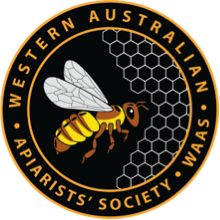 | WESTERN AUSTRALIAN
|
LEGAL OBLIGATIONS
Bees are considered to be livestock under the Biosecurity and Agriculture Management Act (2007) and as such there are certain legal obligations involved in keeping them. The following information refers to the legal obligations associated with hobby beekeeping - commercial beekeepers should contact DPIRD for more detailed advice. There is additional information about your responsibilities on the DPIRD website.
- Registering as a beekeeper
- Bees to be kept in hives of an approved design
- Applying your registered hive brand
- Apiary signage
- Record keeping
- Selling or disposing of hives or nuc's
- Provision of water
- Provision of appropriate care
- Immediate reporting of declared pests
- Complying with local bylaws and policies
- Registering as a food business (if you plan to sell your honey)
- Obeying fire bans
- Where to get help
1. Registering as a beekeeper
It is a requirement under the Biosecurity and Agriculture Management (Identification and Movement of Stock and Apiaries) Regulations 2013 that beekeepers are registered and that each beekeeper has a unique identifier. This "brand" must be applied in such a way that it can not be easily removed.
Information on your legal requirements and how to register can be found on the Department of Primary Industry and Regional Development website - Registering as an owner of stock or as a beekeeper.
Once registered you must pay your annual Agricultural Produce Committee (APC) beekeeper fees, managed by DPIRD.
In a nutshell the following applies:
- You must not be or become a beekeeper unless you are registered.
- You must identify every hive super you own with your registered hive brand (see below).
2. Bees to be kept in hives of an approved design
Regular inspections of brood and honey frames are necessary to ensure hives remain free of pests and diseases. For proper inspections, all hives must have easily and individually removable frames to allow for thorough examinations of the comb. Hives in barrels or skeps which don't allow easy inspection are not approved, as are standard hives where the bees have been allowed to build tangled cross comb. Below are some examples of non approved hives.




Photos courtesy of DPIRD
3. Applying your registered hive brand
A registered hive brand consists of a combination of one or more letters and one or more numerals as chosen from the available combinations, or allotted by DPIRD. You can search the register here.
As of July 2025 there is more flexibility in how you can brand your hive:
- Each letter and numeral must be 19 mm in height or larger, set in alignment but not conjoined.
- The brand can be burnt in, stamped, carved or scored, so that it is distinctly impressed below the level of the surface of each brood box and super (see the first example below)
- Alternatively, you can use a method that firmly adheres to the hive, such as a plaque, adhesive letters or numbers, permanent markers or paint, as long as the branding is clearly visible, permanent and durable in an outdoor environment (see photos 2-4 below)
- You must apply your brand within 7 days of taking possession of your hive and every external component must be branded - brood box, honey super and any nuc boxes.
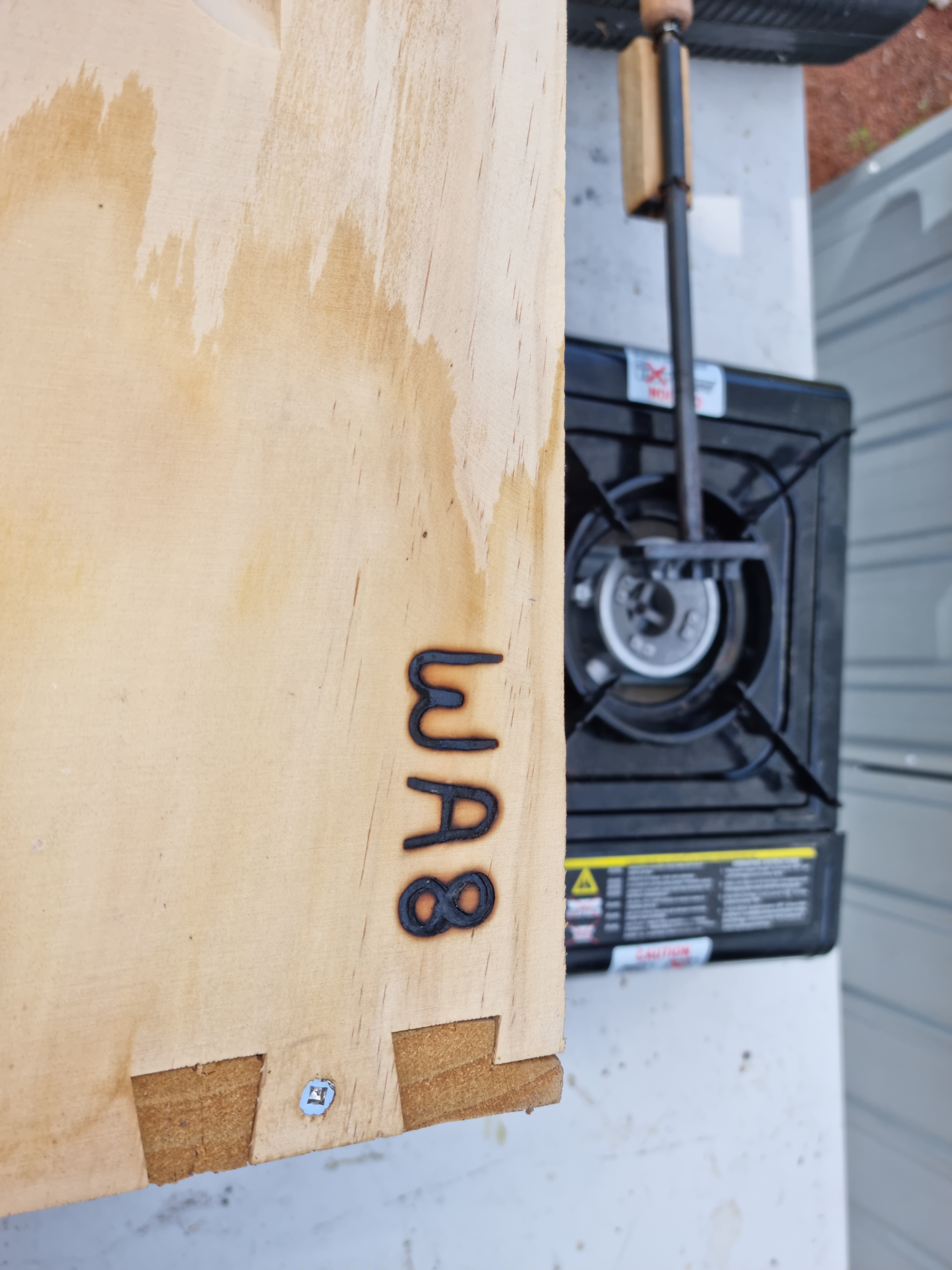



If you buy a hive from another registered beekeeper, you must apply your registered brand to the new hive boxes within 7 days of taking possession. To do this you will need to strike out, remove or cover the previous owners brand using permanent and durable material :
- If the brand is burnt or scored in, you need to burn in, stamp or score a line through the old brand.
- If the old brand has been stuck or painted/drawn on, it must be removed or covered and the new brand applied.
4. Apiary signage
If you keep your bees at a site that is not your own property you are required to display a sign near the hives. The sign must be positioned to be clearly visible to all people approaching the apiary. The sign must contain;
- your full name; and
- your telephone number; and
- your registered hive brand; and
- the street address of your place of residence or business in letters of not less than 50 mm in height
5. Record keeping
A beekeeper who establishes a new apiary or who removes an apiary or part of an apiary from one site to another site must, as soon as practical after the event, make a written record of the establishment of the new apiary or of the removal of the apiary, or part of the apiary, to the other site.
This record is to be kept for 7 years.
Records must be provided to a Gazetted Biosecurity and Agriculture Management Act inspection on request.
There are many online applications that will assist in your record keeping, as well as traditional hard copy records. A sample WAAS Apiary and Hive Inspection Record sheet is available here.
6. Selling or disposing of hives or nuc's
If you sell, lease, supply or dispose of a bee hive or nucleus hive to another person you are required to record the persons:
-
name and postal address; and
-
registered hive brand, having confirmed, by reference to the online register, that the person is the registered owner of the brand and having made a written record of that confirmation.
This record is to be kept for 7 years.
7. Provision of water
Unless water is available from natural sources, every beekeeper must provide a good and sufficient supply of water on every apiary site in a way that is readily accessible to the bees on that site.
Bees may drown if not provided with safe entry to water sources - below are some examples where bees can safely access water.
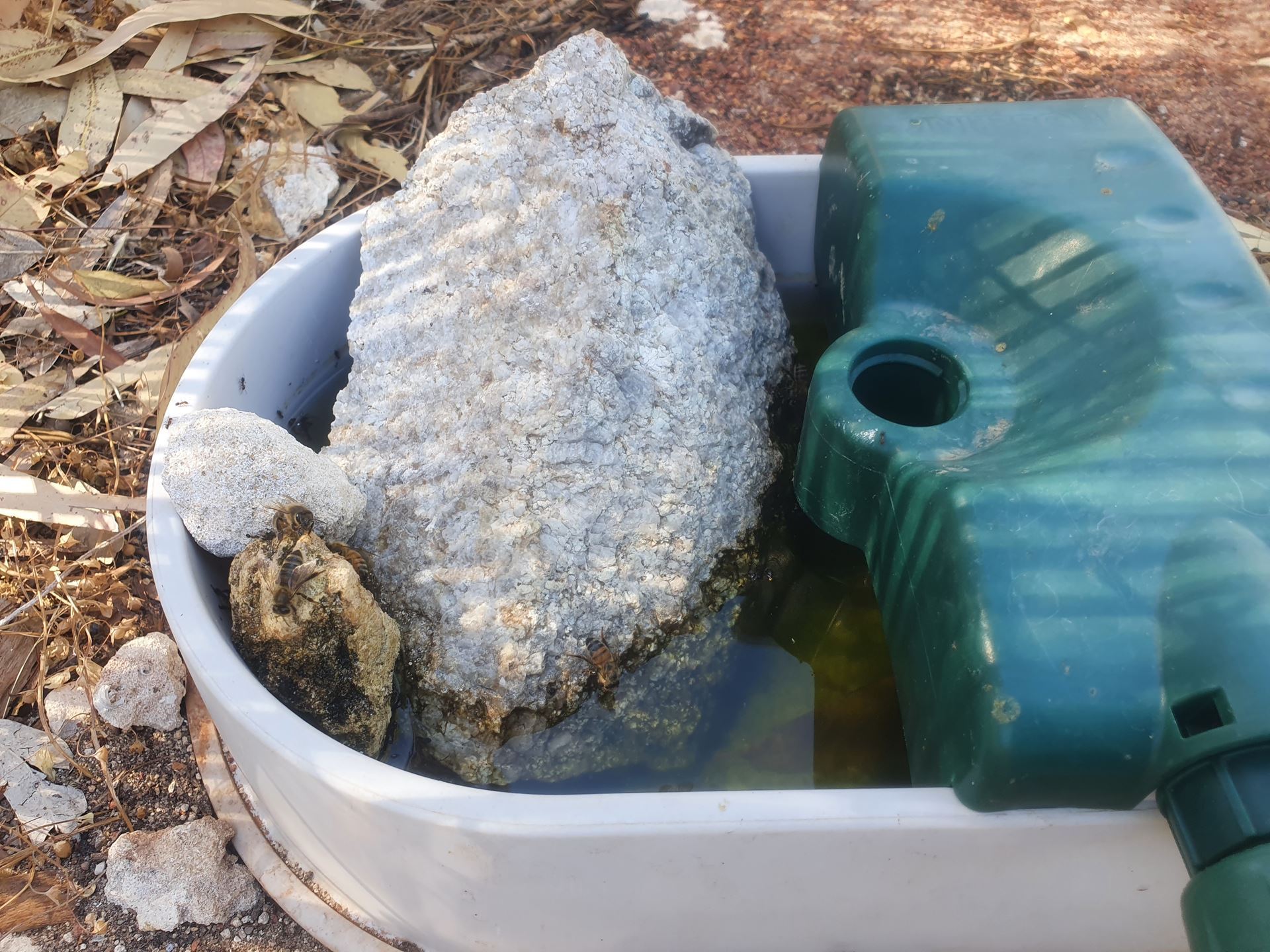
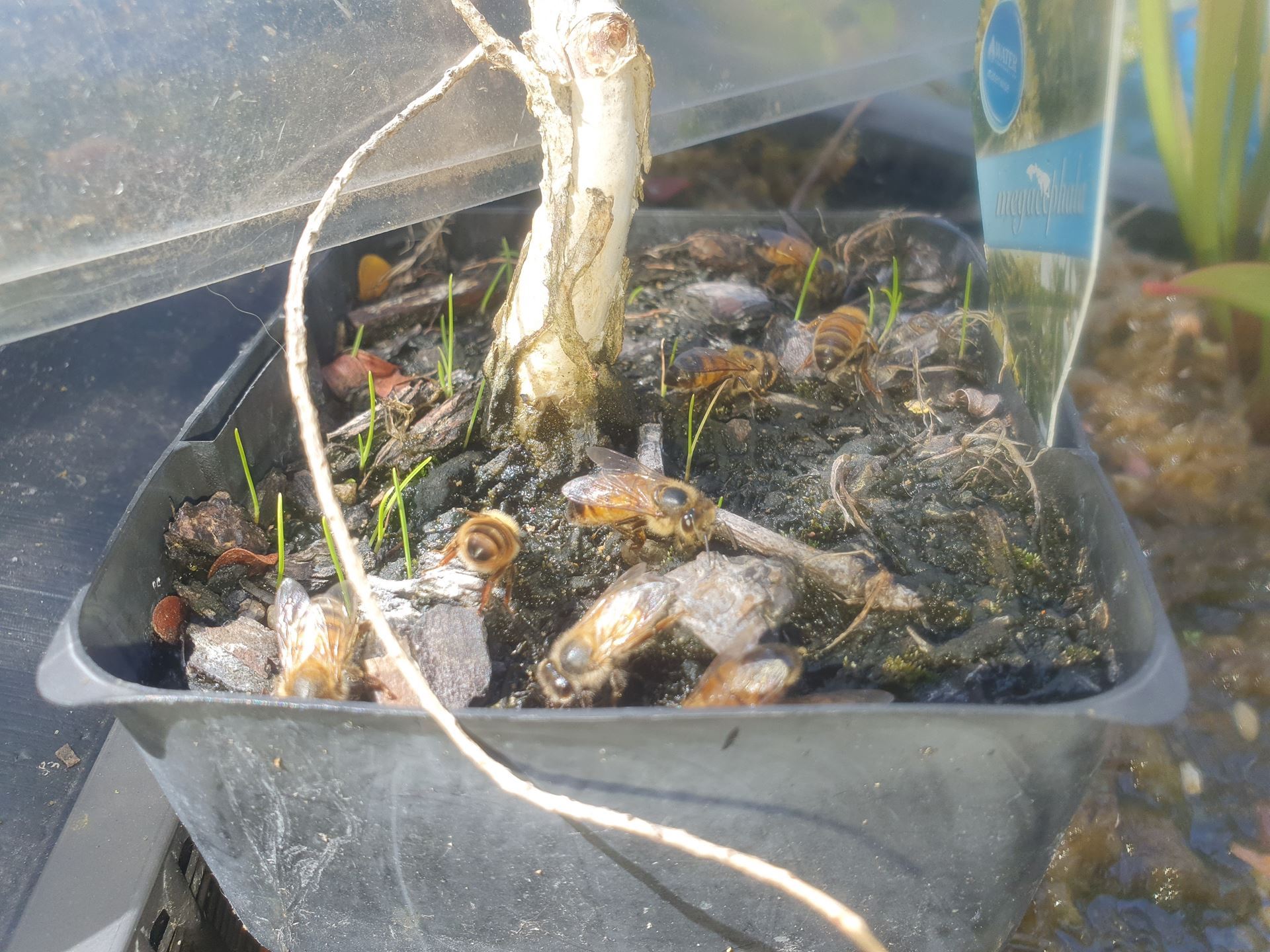
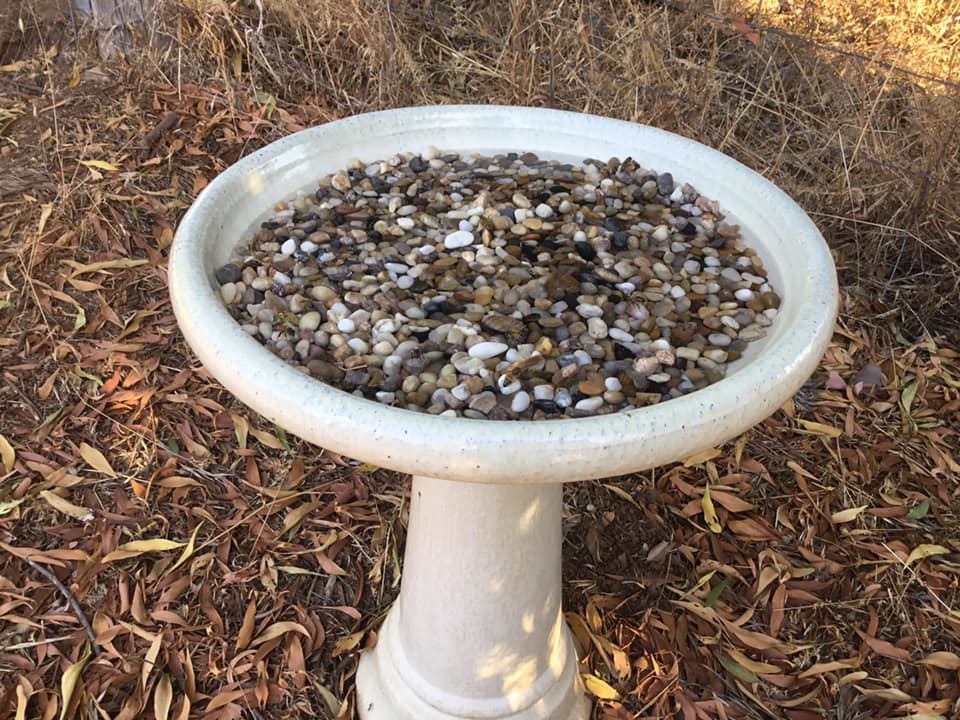
8. Provision of appropriate care
A person who owns, or has the charge, care or possession of, bees or any hive that contains, or has contained, bees must NOT:
- Store, or cause to be stored, a hive unless the entrance to the hive is closed.
- Expose used hives, combs or honey in such a manner as may attract bees to rob from the hives, combs or honey.
- Store hive products in a way that attracts declared pests to breed and develop in them.
9. Immediate reporting of declared pests
Beekeepers must immediately report the presence of declared bee pests to the Deparment of Primary Industry and Regional Development. The current list of declared pests in Western Australia is below.
In addition, there are a number of potential pests which are not yet present in Western Australia but which MUST be reported if found. These include varroa mite, honeybee tracheal mite, various debilitating bee viruses and other bees such as Asian honey bee, giant honey bees, africanised bees and cape honey bees. You can read more about these established and exotic pests on the BeeAware website. If you think you have found any of these exotic pests, they must be reported immediately to the Exotic Plant Pest Hotline on 1800 084 881.
If you notice something unusual in your hive, or can identify a declared pest, dont use social media to spread the word. Take a picture of what you have found and contact DPIRD:
- by emailing the department’s apiary unit at PBhoney@dpird.wa.gov.au
- calling the Pest and Disease Information Service on (08) 9368 3080; or
- submitting a report using the MyPestGuide Reporter app.
There is a wealth of information on DPIRD bee pests page .
10. Complying with local bylaws and policies
Before keeping bees on your property you must check with your local shire or council and make sure you comply with their bylaws relating to bees. Every local government authority currently has different rules - some charge an annual fee, others require stringent compliance with a very narrow set of regulations, others are happy as long as your neighbours are happy.
If you get the opportunity, please show your local government authority the WAAS Best Practice Guidelines for Urban Beekeeping which outlines responsible beekeeping practices.
11. Registering as a food business (if you plan to sell your honey)
Processing or selling honey commercially, even in small quantities, is considered to be a "food business" under the Food Act 2008 and associated regulations. Before operating your food business you need to register or notify your business with the relevant enforcement agency, either the:
-
local government Environmental Health Services, or the
- Department of Health, Environmental Health Directorate.
The organisation you notify or register with depends on where you operate, and what type of business you are operating.
Most honey based food businesses will need to register with their local government.
Your local government will require you to meet certain health requirements relating to the safe preparation of your honey products and may involve regular inspections of your prepration facilites, annual fees and so on. You can read more about what is required for a home-based business on the Department of Health website.
Other legal requirements around selling honey include the need to label your product. You can read more on the Food Standards webpage. This site also has a new online tool to help you create your own nutrition labels. WAAS members can purchase pre-printed nutrition labels from our online store.
12. Obeying fire and vehicle movement bans
During the restricted burning period (October to April), smokers can be used with caution. According to the Bush Fires Regulations 1954, pt 39CA, you must:
- have at least one fire extinguisher available
- have prepared an area of 3 m around your hives, either by clearing or dampening down with water
- place your smoker in a fire resistant container when not being held
- extinguish the fire in the smoker when finished.
When a total fire, harvest or vehicle movement ban is declared, beekeepers must not: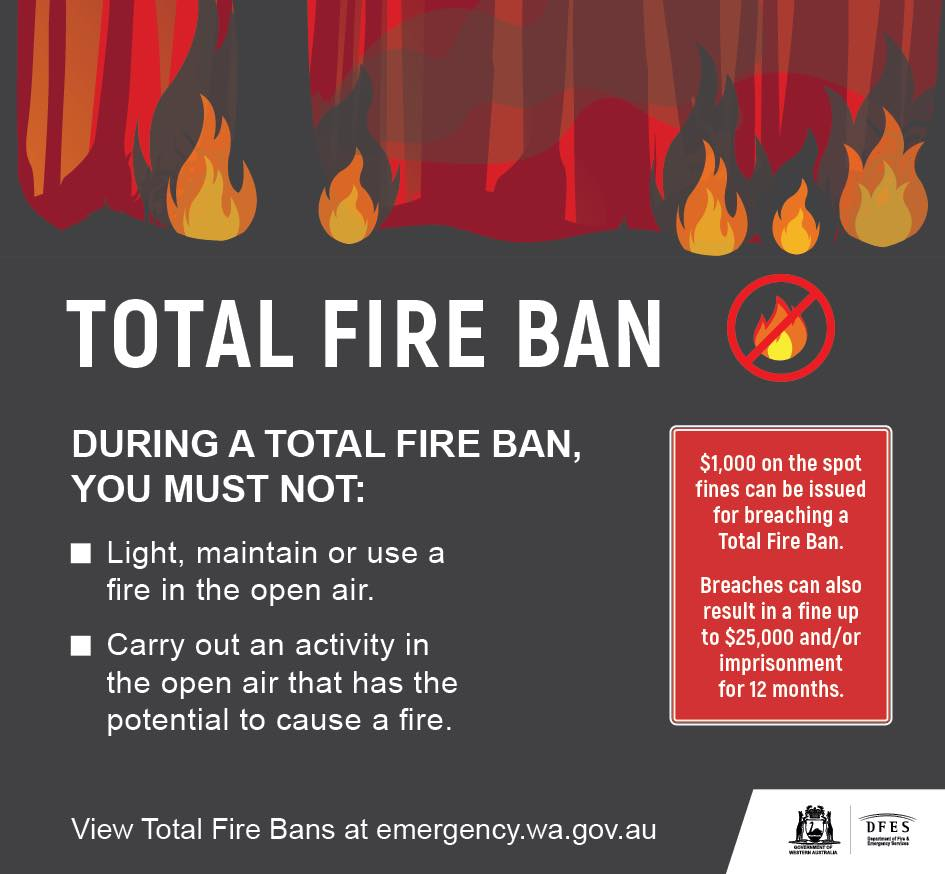
- light smokers
- operate vehicles off road
More information about fire bans can be found on the DFES website.
For current harvest and vehicle movement bans, check with your local government.
13. Where to get help
For more information on your legal requirements as a beekeeper contact the DPIRD apiary team at pbhoney@dpird.wa.gov.au
For brand inquiries contact brands.bunbury@dpird.wa.gov.au
Updated 21/11/2025
